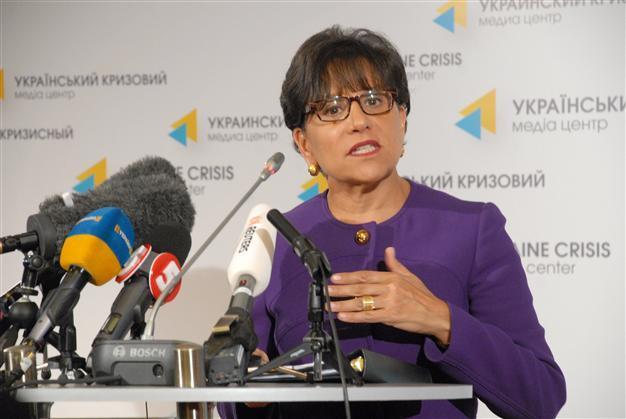Washington urges Turkey to improve transparency to lift business barriers
ISTANBUL

Pritzker particularly complained about the obstacles faced by international companies in competing for tenders. AA Photo
U.S. Secretary of Commerce Penny Pritzker has urged Ankara to introduce rules that will improve transparency in government procurement, as part of efforts to lift hurdles faced by U.S. companies in Turkey.“The Turkish government should act now to adopt rules that promote non-discrimination, fair competition, and transparency in government procurement,” the top U.S. trade official said, addressing a Turkish American Business Association-American Chamber of Commerce in Turkey meeting in Istanbul on Sept. 30.
In her first visit to Turkey as U.S. Secretary of Commerce, Pritzker attended the American Business Forum for Turkey’s 10th Anniversary Gala in Istanbul’s Ritz Carlton Hotel.
At the forum, she stated that economic relations between the two countries were still not at the level they should be. Recalling that there are a number of upcoming aerospace and transportation tenders in Turkey, Pritzker suggested that foreign companies were being hampered in bidding for such tenders.
“Foreign companies want to bid on these contracts – and many bring critical expertise to the table – but historically they have endured a series of burdensome and unfair requirements just to be considered in the process,” she said.
As a result, qualified and committed foreign companies “unfortunately … do not participate in the tenders nor even enter the market,” she added.
“It has now been 5 years since our leaders announced that we would elevate our commercial relationship. Frankly, the time is now to hit the accelerator,” Pritzker said.
The U.S. secretary of commerce also underlined that both countries need to address market challenges if they are “serious” about increasing bilateral trade and investment, raising the problem of commercial offset requirements in Turkey’s healthcare, medical devices, and commercial aircraft sectors.
The Turkish government has been pursuing local production requirements in many of its tenders as part of efforts to create employment opportunities across the country.
“This policy, which forces companies to produce locally is an impediment to American and foreign firms in their efforts to access the Turkish market. I appreciate the importance of creating jobs in local markets and the desire to have foreign companies make long-term investments. But this approach is both onerous and can be counterproductive to attracting foreign direct investment,” Pritzker said, “strongly urging Turkey to review this policy.”
She particularly pointed to the difficulty experienced by U.S. pharmaceutical firms in obtaining necessary licenses to operate in Turkey due to the limited capacity of inspection institutions.
“U.S. pharmaceutical firms need to have their facilities inspected by Turkish authorities before receiving certification and the authority to market their products. But the Turkish Ministry of Health – the certifying body – does not have the capacity to conduct these inspections in a timely manner,” Pritzker said.
“This often leaves companies that have already made an investment in Turkey stranded in a holding pattern and with restricted access to Turkish consumers,” she added.
















